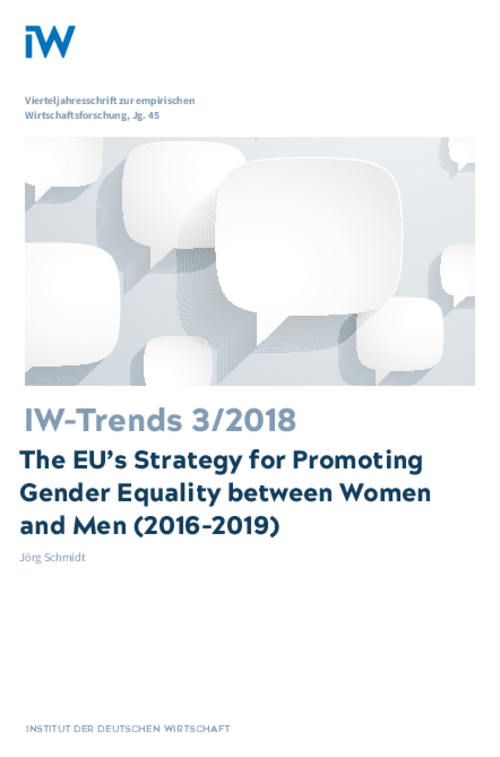This paper examines possible options for refining the indicators in three economic related policy areas of the EU’s strategy for gender equality between men and women (2016–2019). The objectives and measures of the EU strategy are not analyzed, but modifications and extensions of the empirical reporting are proposed.

Options for Refining the Indicators in the Three Priority Areas of Economic Policy: The EU’s Strategy for Promoting Gender Equality between Women and Men (2016–2019)
IW-Trends

This paper examines possible options for refining the indicators in three economic related policy areas of the EU’s strategy for gender equality between men and women (2016–2019). The objectives and measures of the EU strategy are not analyzed, but modifications and extensions of the empirical reporting are proposed.
As a result, the causes of existing gender-related inequalities are taken into (even) greater consideration. The additional information provided can also help to better predict the expected effects of certain policies prior to policy decisions. First, additional data on self-employment by men and women could support the development of differentiated policy recommendations for (dependent) employees and self-employed persons. In addition, the Gender Overall Earnings Gap provides no added value. Assessing the progress by means of the data underlying this synthetic indicator seems more appropriate. Furthermore, as part of the indicators in the area of economic decision-making, focusing on the macroeconomic level rather than on a particular group of the largest companies would result in important additional insights. Despite technical constraints, disaggregation by age may be particularly useful, for example to highlight the special significance of reconciling work and family life.

Jörg Schmidt: The EU’s Strategy for Promoting Gender Equality between Women and Men (2016–2019): Options for Refining the Indicators in the Three Priority Areas of Economi
IW-Trends

More on the topic

Areas of Conflict and the Role of Works Councils in the Digital and Green Transitions
Digitalisation processes and investments in environmental and climate protection are often accompanied by the introduction of new procedures and working methods.
IW
Determinants of personnel planning in Germany
The German labor market has been growing since 2005. The dip in the wake of the coronavirus pandemic between 2020 and 2022 is an exception, as the German labor market has reached a record level of 45.9 million people in employment by 2023.
IW